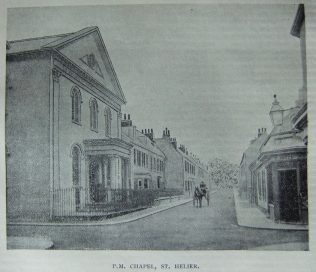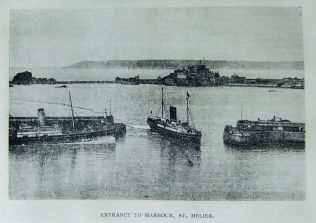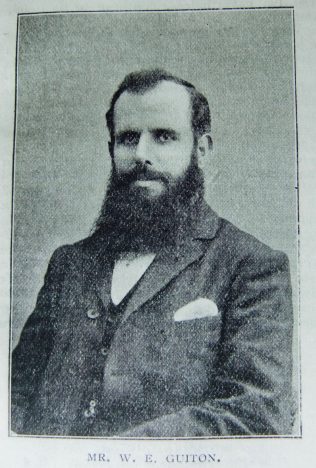Jersey Circuit




Transcription of an article in the Christian Messenger by ‘Rhoden’
THE beautiful island of Jersey claims to be the sunniest and brightest spot in the British Isles. Set in bright waters, and sun-bathed nearly all the year round, together with its sylvan and marine beauties, all this makes it irresistibly attractive to every lover of what is eye-pleasing in nature.
A native author of authority, ‘E.T.N.,’ says, ‘A visit to this gem of the Channel comprises charms of novelty, change of scene, of language and customs, which constitute one of the chief pleasures of foreign travel. From every point of view this island presents matters of interest and attraction; to the historian they appeal, to the antiquary perhaps more forcibly; to the lover of natural history and to the admirers of beautiful scenery, its claims are paramount. Here is to be found the most happy, the most contented, and the least taxed people in the length and breadth of the kingdom – a remarkable people, whose loyalty and whose affection for their Sovereign and Government are matchless.’
This island, the chief, largest, and most southerly of the Channel Islands, is 14 miles from the Norman Coast, from Southampton, and 95 from Weymouth. It is 12 miles in length from east to west, and in some parts is about half that width. Its population is less than 60,000 – one half rural, the rest in the capital, St. Helier and suburbs. It is estimated to contain 39,580 English acres, nearly two-thirds of which are under cultivation. On the east, south, and west, the coast of Jersey consists of large open bays, each terminated by rocky headlands. The eastern side is most wooded; there are sandy coves on the south and west, and on the north, north-east, and north-west shores there is much picturesque rock and cliff scenery, the highest ground in Jersey being ‘Les Platons,’ 485 feet above the sea-level.
Referring again to Jersey’s natural beauties, nowhere else can so entrancing a variety of landscape scenery be found in so small a space. ‘On first approaching the island you are struck with its picturesque rock-bound coast and its bays of bright golden sand, alternating with slopes of green pasture and woodland, seemingly running right to the water’s edge, the quaint towers standing sentinel-like all around the coast, and the pretty villas dotting the land here and there. Once ashore, the ever-varying scenery, blending landscape and sea view, becomes even more beautiful and entrancing as you approach the hills, dales, and hamlets of the interior, or the bays and headlands which intersect or jut out along the coast – the quaint farmhouses and neat cottages embosomed in flowers possessing a fascination all their own.’
Victor Hugo styled Jersey a ‘lovely garden of the sea,’ and as far back as 1640 the poetic Earl of Dorset described it as ‘The brightest flower in England’s diadem.’
Max O’Rell says, ‘I have been round the world. I know America, Africa, Australia, New Zealand; I know Europe fairly well. I do not remember having ever spent a fortnight more agreeably than in the pretty, picturesque, and interesting little island of Jersey.’
In many respects the history of Jersey is quite romantic. For centuries the Island was known as Augia, long before the Romans ever set foot in it. It is established beyond doubt that the earliest inhabitants of Jersey were Celts, for there are relics of Celtic worship scattered all over the Island. The Druids too, made the Island a resort, for Jersey is rich in traces of Druidic worship, though most of the Druid monuments have now disappeared.
When the Romans pursued their conquering career westward, the Channel Isles did not escape them. It is said ‘they came, saw, and conquered’ here. How long they remained in possession of Jersey is not known, but their occupation of the island is amply proved by the frequent discoveries that have been made of coins, pottery, and weapons of the period.
Originally Jersey formed part of the Duchy of Normandy, during which it advanced in population, wealth, and general importance. When Henry II. came to the English throne he ruled the Channel Islands as the lineal descendant of William the Conqueror, as also did his son Richard II.
Then came King John, who with all his faults and weaknesses, was a real benefactor to Jersey. He signalised his reign by giving Jersey ‘Home Rule.’ The Charter he gave them has never been suspended or abrogated, and continues to this day. It completed their severance from the Normandy of France.
The Constitution of Jersey is not without interest. There are twelve parishes, and these are divided into vingtaines, and a system of honorary police prevails, the chief of?cer being the Constable or Mayor, who is elected by the ratepayers for a term of three years, and who, besides administering parochial affairs, generally represents his parish in the Legislative Assembly of the Island.
This Assembly was originally formed by the Royal Court summoning to its assistance the beneficed clergy and the chief municipal officers of the Island. In addition to these three bodies, a new class of member, called Deputies, three for the capital, St. Helier, and one for each of the eleven rural parishes, was created in 1856. The Assembly now consists of the Lieutenant-Governor, the Bailiff, who presides, the twelve Jurats of the Royal Court, the Rector of each parish as life members, the twelve constables representing the twelve parishes, and the fourteen Deputies, a total of fifty two.
The Lieutenant-Governor is appointed by the Crown, is bound to obey the Queen’s commands signified through the Secretary of State, and invariably, though not necessarily, is a general officer of Her Majesty’s army. In his civil capacity he is subject to the control of, the Home Secretary, and answerable to the jurisdiction of the Privy Council; in his military capacity he is responsible to the Horse Guards and the War Office. He is the of?cial channel of communication between the Home Government and the Island authorities through the Home Office.
The Assembly sits twice a week from January to March, and all legislation adopted is subject to the sanction of Her Majesty in Council, except certain provisional regulations which are valid for a term of three years.
Max O’Rell says, ‘The autonomy of Jersey is perfect. The people make their own laws, levy their imports and pay no tribute whatever to the English. . . . . The Jersey people have advanced little by little without difficulties or violence, and without revolutions, and have now succeeded, while clinging to their past, in firmly establishing among themselves a government which should be the envy of the whole world.’
Referring to the agriculture of the Island it is interesting to note that the majority of the farm-holdings are small, many being under ten acres, while from fifteen to twenty acres is the average, and rarely do any exceed fifty or sixty acres. A considerable portion of the land is not tilled by the owner, but is let to French or other thrifty tenants.
Characteristic features of the rural districts are the quaint old manor-houses with Norman arched doorways, the picturesque wayside wells, the curious style of the farmers’ carts, ploughs, churns, and milk-cans; while over many doors may be noticed stones bearing the initials of the original proprietors, husband and wife, and the dates interwoven with hearts as emblematical of conjugal amity. Then in almost every farm-house one finds in the kitchen or sitting-room a wooden frame covered with dried fern, on which the inhabitants repose in the evening – this corresponding with the chimney corner in old English farmhouses.‘
The principal product of Jersey is the early potato, which, owing to the mildness of the climate, is ripe and ready for use many weeks earlier than in England. Fruit of which there are fine specimens, is largely grown here too. Grapes and tomatoes are much exported, oranges ripen in the open, the fig tree grows and bears fruit, and lemon trees live exposed through the winter.
The luxuriance of vegetation in the flower gardens and shrubberies is exceptional, and numerous varieties of foreign and often tropical plants live and flourish.
It might be mentioned that the old Norman language is fast dying out in Jersey, though it is still to be heard in the country districts, where it is often spoken in the homestead. The official language of the Courts and Assembly is French, and even as recently as seven years ago, a proposal in the Legislative Assembly to permit the optional use of English in debates, was defeated by a large majority. The laws are all written in French, and the clergy as well as some nonconformists, always preach in French, and yet Jerseymen are among the most devoted and loyal subjects of Her Majesty Queen Victoria. The character of the people is orderly and frugal, and there is little pauperism, and hardly any serious crime.
The introduction of Primitive Methodism to this lsland dates back to 1832, the honour belonging to a coloured man named Cousins. He opened his campaign on May 20th, in Union Street, St. Helier’s, The cholera was raging there at the time, and was working sad havoc among the Islanders. Mr. Cousins made it a special point to visit as many as possible of those who were sick and pray with them, and this enabled him to get straight to the hearts of the people, and quickly to gather a congregation.
After a time, the place of meeting was removed to Garden Lane, where for some reason or other the cause declined, and was eventually abandoned, and the few members were scattered. The ministers up to this point had been of the name of Cousins, Parsons and Storr.
Then the Rev. Robert Hartley, of whom our princely philanthropist and friend, Mr. W. P. Hartley, J.P., of Aintree, is a worthy descendant, came on the scene, and his advent to Jersey brought resurrection and life to the cause so soon withered and dead. A Mrs. Seeward, the oldest living member of Jersey Primitive Methodism, though all but bed-ridden for years past and only able to get out by means of a bath-chair, can tell some strange and thrilling stories of those early days. When but a girl of 16 or 17 years of age she remembers being on the pier at St. Helier’s when Robert Hartley landed – his knee-breeches and broad-brimmed hat attracting her attention, though at that moment she knew not the man or his mission.
We have no official record of this date, but the Baptismal Register at St. Helier’s gives the date of his first baptism, March 7th, 1839.
John Petty, who visited the Channel Isles in 1851, writing to the Magazine of that year, says in reference to Jersey – ‘It was a joyful day to the few faithful members left when another Primitive Methodist Missionary (Rev. Robert Hartley), visited the Island and re-organised the society; and they have lived to witness the progress of the cause dear to their hearts, till a large chapel has been erected in a pretty good situation. Robert Hartlev built the St. Helier’s chapel, and left the station for another sphere in 1841.
Between this and 1849 there appear the names of James Blades, Samuel Chapman, Levi Ramsden and Joseph Thomason, whose ministerial labours Guernsey and Alderney, as well as Jersey.
As near as can be ascertained from the Jersey Circuit records, the following ministers have laboured at Jersey amid varied difficulties and discouragements, all helping more or less to develop our denominational interests in that Island:- John Holroyd, 1849-52; John Rackham, 1852-54; John Healey, 1854-56; Henry Sherman, 1856-58; Peter Coates, 1858-59; W.R. Widdowson, 1859-61; John Hunt, 1861-62; Samuel Loxton, 1862-65; William Tubb 1865-68; Edwin Clarke, 1868-70; William M. Barratt, 1870-71; John Holroyd, 1871-72; George G. Pinder, 1872-75; John Evans, 1875-77; Henry Roe, 1877-79; R.H. Horrocks, 1879-81; Samuel Parkin, 1881-82; John T. Horne, 1882-87; Thomas Saunders, 1887-92; George Wood, 1892-96; and George B. Leghorn, the present minister. He commenced his ministry there in 1896, and it is still being continued with unquali?ed success.
In addition to St. Helier’s Chapel, our people possessed for 18 years a nice little chapel at Beaumont, a small suburb of St. Helier’s. For some reason or other this was sold to a private purchaser in 1883. Subsequently it passed into the hands of the Bible Christians, who placed a minister in residence there, since which it has succeeded fairly well. If our people could only have adopted a similar policy there is no doubt that Beaumont would have responded to the activities of our Church life, and that at least success equal to that now enjoyed by the Bible Christians would have been achieved. To us, seventeen years later, it appears a mistake to have withdrawn from Beaumont, but no doubt the authorities of that day did their best, and their decision would not be reached without due deliberation and care.
Primitive Methodism has had to encounter great struggles and numerous discouragements in this Island, there is no doubt, but it is some comfort to know that the flowing tide is with our church there to-day.
In 1887 the debt on our St. Helier’s Chapel was £840; this was reduced by £152 during the next ten years, and during the last three years it has been reduced a further £340, so that the remaining debt is only £348, and I have heard it whispered, that the next stroke will be for its entire liquidation.
Latterly, the Circuit has been extremely fortunate in having a succession of able and successful ministers – men who have made a distinct position for themselves on the Island, but among them none have done better and achieved a wider and better reputation than the present minister, Rev. G.B. Gleghorn. His genial disposition, his gentlemanly bearing and never-failing courtesy, have won for him golden opinions among Jerseymen, and it would give immense satisfaction to them for him to continue his ministry on the Island for several more years,
The present condition of our church-life in Jersey, together with the general character and attendance at public services and the various institutions of the church, all go to show that the ministry of Mr. Gleghorn is one of fine quality, and that it is an operative force in the life and character of the people. His wife, too, deserves worthy recognition as one who seeks to help and never to hinder the work of God in her husband’s hands.
The Circuit steward, Mr. W.E. Guiton, is a man of fine calibre and position. How long he has held that position I am unable to say, but I have no hesitation in stating that it was a wise appointment, and that he has filled the position with dignity and honour.
As the Proprietor of ‘The Jersey Evening Post,’ Mr. Guiton has achieved for himself a unique position among his countrymen. As a man of business he is keen, tenacious, capable, and enterprising, and in Jersey, among his own kinsmen, his name is always mentioned with respect. A specially gratifying feature in Mr. Guiton’s successful career is that, notwithstanding his ever-improving social position, he has never slackened in his love and devotion to our Church. Both he and his excellent wife and two daughters are passionately interested in Primitive Methodism, and they are always ready for any service by which their own Church can be assisted to greater success.
Mr. Guiton, too, is never slow to give publicity in the columns of his paper to any information that shows the growing strength and power of Primitive Methodism in the United Kingdom. As long as Mr. Guiton stands related to ‘The Jersey Evening Post ’ as he does, he may be trusted to use every opportunity to the best advantage for calling attention to the work and success of his own denomination. He is an enthusiastic Primitive Methodist, and rejoices in its work and progress.
It is only fitting that attention should be drawn here to the contribution Jersey Primitive Methodism has made to the Connexion as a whole. It is worthy of mention that not only has it honoured its denominational obligations, financial and otherwise, but it has given to our ministry our esteemed friend and brother, Robert R. Connell, who for so many years past has occupied a leading position in connection with London Primitive Methodism. Both he and his excellent wife are products of our Jersey Church, and we sincerely thank God for them. They have both served our Church long, generously, and faithfully, and have always reflected credit on the Church that was the means of their spiritual birth and promotion to the ministry.
This ‘corner’ may be a long distance from us, but we can always be assured that here are hearts loyal and true to Primitive Methodism.
References
Christian Messenger 1900/307





No Comments
Add a comment about this page